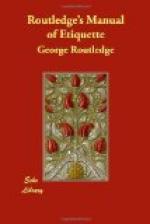By the Statute 6th and 7th William IV., 17th August, 1836, Roman Catholics and Dissenters who may wish to be married in a church or chapel belonging to their own denomination, can obtain a licence for that purpose from the Superintendent Registrar of the district in which one of the parties resides, after giving notice thereof a week previous to the same officer. The expense of the licence is L3 12s. 6d.
Marriage before the Registrar.
Should the parties wish to avoid the expense of a licence, they can do so by giving three weeks’ notice to the Superintendent Registrar; which notice is affixed in his office, and read before the proper officers when assembled; at the expiration of that time the marriage may be solemnised in any place which is licensed within their district. The Registrar of Marriages of such district must have notice of and attend every such marriage. The fee due to the Registrar of Marriages for attending the ceremony and registering the marriage (by licence) is 10s., and for certificate 2s. 6d; and without a licence 5s., and certificate 2s. 6d.
Marriages also by the above-mentioned Act of Parliament may, upon due notice, be celebrated in the office of the Superintendent Registrar, with or without licence, or with or without any religious ceremony; but the following declarations, which are prescribed by the Act, must be made at all marriages, in some part of the ceremony, either religious or otherwise, in the presence of the Registrar and two witnesses—viz., “I do solemnly declare that I know not of any lawful impediment why I, A B, may not be joined in matrimony to C D;” and each of the parties shall also say to each other—“I call upon these persons here present to witness that I, A B, do take thee, C D, to be my lawful wedded wife” (or husband).
It is highly to the credit of the people of this country, and an eminent proof of their deep religious feeling, that all classes of the community have virtually repudiated these “Marriages by Act of Parliament;” nor would we advise any fair maiden who has a regard to the comfort and respect of her after connubial life, to consent to be married in the Registrar’s back parlour, after due proclamation by the Overseers and Poor-Law Guardians.
The Bridal Trousseau, and the Wedding Presents.
The day being fixed for the wedding, the bride’s father now presents her with a sum of money for her trousseau, according to her rank in life. A few days previously to the wedding, presents are also made to the bride by relations and intimate friends, varying in amount and value according to their degrees of relationship and friendship—such as plate, furniture, jewellery, and articles of ornament, as well as of utility, to the newly-married lady in her future station. These, together with her wedding dresses, &c., it is customary to exhibit to the intimate friends of the bride a day or two before her marriage.




